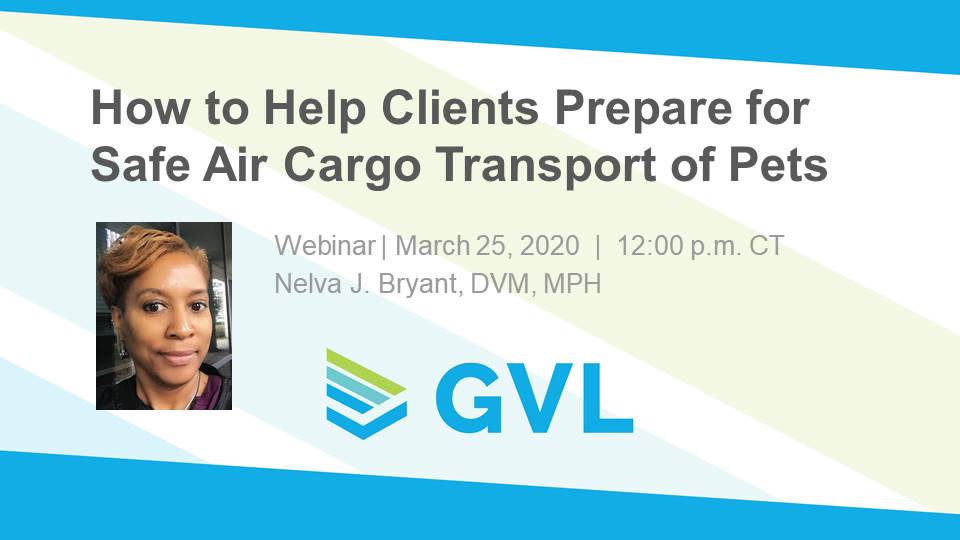In our recent webinar, How to Help Clients Prepare for Safe Air Cargo Transport of Pets, Dr. Nelva Bryant presented on what veterinarians can expect with air transport of animals, suggestions to prepare pets for travel via cargo, and the risks and stressors associated with transport.
Here, we’re sharing resources and summarizing Q&A from the webinar. If you still have questions related to air cargo transport, please contact us and we’ll add them to this list.
Questions and answers from the webinar
There were many questions submitted by webinar attendees, and not all of them could be addressed in the hour-long session. We have compiled the questions and worked with Dr. Bryant to provide answers to the best of our knowledge. Click on a topic to expand the Q&A.
Animals
USDA Animal Welfare Act Regulations mandate the minimum age requirements for air travel via cargo is eight weeks of age for dogs and cats. However, an airline can establish policies that are more stringent than USDA and require the minimum age for travel to be greater than eight weeks of age. In preparation for travel, the animal owner/shipper must research the minimum age requirements for travel for the airline.
For transport via cargo an airline can mandate that certain dog or cat breeds are embargoed. These breeds are embargoed due to their inherent strength or due to their facial conformation. Please review each airline regarding their live animal policies for transport via cargo.
This is a tough question. As veterinarians, we provide medical expertise and advice to promote the health and welfare of animals. However, the decision to travel with a pet is at the discretion of the animal owner. Please contact the USDA-VS for more information regarding the issuance of CVIs.
Cargo Hold
For international travel, there are requirements to tie down crates. However, for domestic travel there are no specific requirements to tie down crates in the cargo hold of the aircraft. Live animals are the last items to be loaded in the cargo hold and first to be removed from the cargo hold.
The temperature in the cargo hold is maintained around 60°F.
Minimal to low lighting is present in the cargo hold.
Potential injuries that could occur during transport via cargo include pets attempting to escape their crates, as well as crate damage due to baggage/cargo shifting during transport.
Arrangements must be made for animals to be delivered to the consignee or their agent as soon as possible upon arrival at destination. The shipper must advise the consignee of the anticipated arrival. The carrier must notify the destination and transfer stations if the flight is delayed.
Cabin
Each airline has policies regarding in-cabin travel with pets. Please review each airline regarding their in-cabin policies and requirements.
Each airline has policies regarding in-cabin travel with pets. Please review each airline regarding their in-cabin policies and requirements.
Airline Pet Policy Information
Documentation
Acclimation statements are required by USDA-Animal Welfare Act Regulations: www.aphis.usda.gov/aphis/pet-travel/pets-on-planes/quiz-series/quiz-dog-health-acclimation-certificate.
The shipper is responsible for obtaining all the required documentation for transport. According to the IATA Live Animals Regulations, the shipper must ensure that the animals being tendered for transportation are not prohibited by governments and that all the required export, import, and/or transit health certificates, licenses or permits are accompanying the shipment.
Sedation / Anti-Anxiety Medication
No, it is not allowed.
If anti-anxiety drugs are used, make sure the impact of the drug on the animal is known prior to travel. Don’t let the first time the medication is used be during air travel.
International
Yes, cargo staff check all documentation before loading.
GVL Platform
Rabies vaccination certificates are free as part of the GVL platform.
Yes, GVL digital health certificates (CVIs) are accepted in all 50 states as well as the US territories.
The GVL platform currently integrates CVIs with INOVA, ImproMed and HVMS.
A rabies vaccination certificate with a digital signature is accepted in most cases. However, when traveling internationally a country may require a wet signature on the document as well.
Want to watch the air cargo transport webinar online?
The live webinar was recorded, and we have added it to our webinars page to watch online. You will need to register to view the webinar, even if you had previously registered for the live webinar.
If you would like to earn CE credit, you will also need to take a short quiz after the webinar, linked below.
(If you already attended the live webinar for at least 50 minutes and requested CE, a certificate will be emailed to you.)
